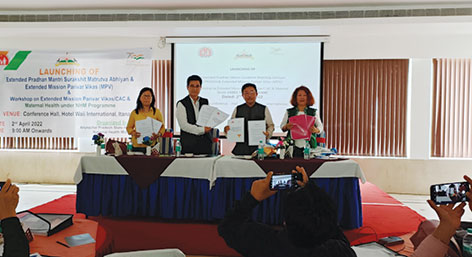ITANAGAR, 2 Apr: The extended Pradhan Mantri Surakshit Matritva Abhiyan (PMSMA) and the extended Mission Parivar Vikas (MPV) were launched by the National Health Mission’s State Mission Director CR Khampa and Family Welfare Director Dr E Rumi at a hotel here on Saturday.
The programme also included a workshop on the extended MPV/Comprehensive Abortion Care & Maternal Health.
“The PMSMA was launched in 2016 as a fixed day, assured, comprehensive quality ANC service on the 9th of every month to every pregnant woman across the country. Screening, identification, line listing and appropriate management of high-risk pregnancies by OBGY/CEmoC specialist and referral to appropriate higher facilities are some of the fundamental elements of the PMSMA,” the State IEC Bureau informed in a release.
The Centre launched the MPV in 2016 for substantially increasing access to contraceptives and family planning services in 146 high fertility districts with a total fertility rate of 3 and above in several high-focus states.
Considering the impact of the MPV strategies in improving contraceptive uptake and maternal infant health outcomes, the scheme is now extended, the bureau said.
“The PMSMA is under the direct supervision of the prime minister’s office. The role and responsibility of districts to achieve the target and safe motherhood is of utmost importance,” Dr Rumi said.
He informed that the state’s total fertility rate has come down to 1.8 percent and institutional delivery has improved to 80 percent, and encouraged the districts to “continue to achieve the set target for extended MPV.”
Highlighting the issue of “home-based deliveries, which is high in a few districts,” he requested the districts to “prevent home deliveries and reduce it and instead improve institutional deliveries.”
Khampa said that “more emphasis is being given by the Centre on PMSMA and MPV, and hence it is being extended up to CHC level which was earlier limited to district level.”
“Ensuring proper health of mother and child is the basic aim of PMSMA,” he said, and requested the DMOs and DRCHOs to “take ownership of the programme and judiciously use their manpower and conduct training, orientation, re-orientation from time to time, if needed.”
“Incentives of ASHAs need to be prioritised in order to motivate them, since they work at village level and are the source to reach the communities,” Khampa said.
He expressed concern over incorrect and mismatched uploading of data on the web portal and requested the districts to review the data before uploading them to the portal. He further requested the districts to conduct maternal death review on time and regularly.
The workshop was attended by DMOs, DRCHOs, obstetricians and gynaecologists from the districts, besides state programme officers and officials of the UNICEF, the bureau said.

